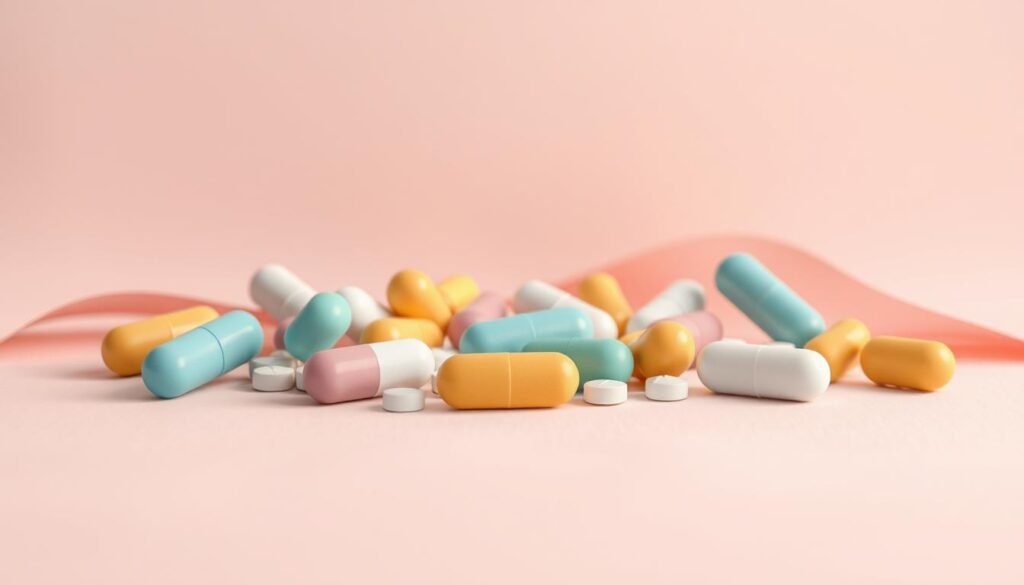Did you know over 17 million U.S. adults face major depression every year? This massive number shows how significant this mental health issue is. It often stays hidden and without treatment. Understanding depression is key to help and support those struggling. In this article, we delve into the causes, symptoms, and ways to diagnose depression. We aim to provide insights to recognize and tackle depression head-on. Organizations like the National Alliance on Mental Illness (NAMI) and the American Psychological Association (APA) add more to our knowledge.
Key Takeaways
- Depression affects over 17 million adults in the U.S. annually.
- Understanding the causes of depression is vital for recognition and treatment.
- Recognizing the symptoms of depression can aid in early intervention.
- A proper depression diagnosis is crucial for effective treatment options.
- Support systems play a significant role in managing depression.
Understanding Depression: An Overview
Depression is more than just feeling sad. It’s a serious mental disorder that can affect anyone, no matter their age or background. The World Health Organization says that depression is becoming more common worldwide. This shows how important it is to understand and be aware of this issue.
This Depression Overview talks about the complexity of depression, showing that it comes in many forms. There are different Types of Depression, each with its own symptoms. Major depressive disorder is well-known, featuring deep sadness and a lack of interest in life. Then there’s persistent depressive disorder, or dysthymia, a long-lasting form of depression that makes daily life difficult.
Bipolar disorder is another type of depression, known for its drastic mood changes. These can range from very sad lows to overly happy highs. It’s important to know these differences to help those who are suffering find the right support.
Knowing how common mental disorders like depression are can create empathy and motivate people to get help. Access to good resources can really improve the lives of people dealing with these tough conditions.
| Type of Depression | Description |
|---|---|
| Major Depressive Disorder | Characterized by persistent sadness, loss of interest, and difficulty in functioning. |
| Persistent Depressive Disorder (Dysthymia) | A chronic form of depression lasting for years, affecting daily life and mood stability. |
| Bipolar Disorder | Includes severe mood swings, from manic highs to depressive lows. |
| Seasonal Affective Disorder (SAD) | Depression that occurs at specific times of the year, often triggered by changes in season and light exposure. |
| Psychotic Depression | Major depression accompanied by psychotic symptoms such as hallucinations or delusions. |
What Are the Common Causes of Depression?
Depression is a complex issue with many causes of depression. Knowing these can help find good coping ways. Some people might get depressed because of genetic factors. If mood disorders run in the family, you’re more likely to have them too. Studies suggest that our genes affect our brain chemistry and how we handle emotions.
Things that happen to us also matter a lot. Traumatic events or long-term stress can lead to depression. Likewise, dealing with ongoing health problems like diabetes or heart disease can wear you down emotionally.
How our brain manages mood involves certain chemicals like serotonin and dopamine. If these chemicals get out of balance, we can feel very sad or hopeless.
Here’s a quick look at the main reasons:
| Cause | Description |
|---|---|
| Genetic Factors | Family history increases risk of mood disorders. |
| Environmental Triggers | Traumatic events and chronic illnesses contribute to depression. |
| Neurotransmitter Imbalances | Fluctuations in serotonin and dopamine levels can affect moods. |
Understanding all the reasons for depression helps in assessing and finding treatments. For more info, check out detailed resources from trusted mental health groups.
Recognizing the Symptoms of Depression
Noticing different Depression Symptoms can change a person’s recovery journey. You can see these symptoms in three big groups: feelings, physical signs, and how someone acts. Knowing these signs is key to get help on time.
Emotional Symptoms
Feeling-related signs are often the easiest to spot. Common ones are:
- Persistent sadness or emptiness
- Feeling hopeless or worthless
- Anxiety or irritability
- Not enjoying things you used to like
People with these Emotional Symptoms might struggle to interact or connect with others.
Physical Symptoms
Physical signs can show up in many ways, including:
- Always feeling tired with no energy
- Eating more or less than usual
- Having trouble sleeping or sleeping too much
- Unexplained aches or pains
These Depression Symptoms can make everyday tasks hard. It’s important to notice and deal with them early.
Behavioral Changes
Changes in how a person acts can also hint at depression. These changes might be:
- Not wanting to hang out with friends or family
- Doing worse at work or school
- Using more alcohol or drugs
Seeing these Behavioral Changes in someone you care about is vital. Getting help early can lead to successful treatment. Grouport Therapy offers great support.
Decoding Depression: A Closer Look
Understanding depression is not straightforward. People often go through big mood swings from one day to the next. These changes can affect how they function each day. Mood swings can also make people feel lost and alone.
Many feel a deep sense of losing interest in things they used to enjoy. This is known as anhedonia. It can really change how someone lives their daily life.
Impact on life is more than just feeling sad. Relationships with family and friends may fall apart. This happens as others can’t grasp the mood swings. As a result, people might feel even more alone.
At work or with friends, these mood swings can cause problems. They may reduce how much someone can do and lead to arguments. Stress can go up because of this.
Talking about these issues shows the real effect of depression on a person. Getting support from loved ones and professionals is vital. It helps manage the ups and downs, making life a bit easier.

The Importance of a Proper Diagnosis
Getting the right diagnosis for depression is key to finding the best treatment. It allows health professionals to create plans that meet the unique needs of each person. They use special tools, like questionnaires and interviews, to look closely at symptoms. This method follows strict guidelines set by experts, ensuring a full check on mental health.
Different parts of the mental health check-up help doctors understand someone’s feelings and thoughts. This deep look helps them see if depression is present and if there are other issues too.
Sometimes, people don’t seek help because of stigma or wrong ideas about depression. They might think it shows weakness instead of seeing it as a real health issue. Teaching people about the value of a good diagnosis can help overcome these obstacles.
A correct depression diagnosis can validate a person’s struggles and lead to effective treatments. By comprehending the criteria for diagnosis, individuals can more confidently manage their mental health. They gain the support they need to move forward.
| Diagnostic Tool | Description | Purpose |
|---|---|---|
| Clinical Interview | A structured conversation between the clinician and the patient. | To gather detailed information about symptoms and history. |
| Self-Report Questionnaires | Standardized questionnaires filled out by the patient. | To quantify the severity of symptoms and assess areas of concern. |
| Behavioral Assessments | Observations and evaluations of the patient’s behavior. | To identify patterns that may indicate depression. |
Coping Strategies for Managing Depression
Managing depression is tough, but good coping strategies help a lot. Two main ways are building a strong support group and using mindfulness.
Developing a Support System
Having support is key for getting through tough times. People like friends, family, and support groups can give you comfort and courage. Being around others makes you feel connected and not so alone, which is really important.
To improve your support, you can:
- Find friends or family who help you feel supported.
- Think about joining support groups, either where you live or online.
- Talk to people who have been in your shoes.
Implementing Mindfulness Practices
Mindfulness like meditation and yoga helps your mental health a lot. These activities keep you focused on now, help control your emotions, and reduce stress.
You can start by:
- Doing short meditation sessions every day.
- Trying yoga to bring peace to body and mind.
- Doing breathing exercises to calm anxiety and relax.
Using these coping strategies daily can really change how you deal with depression. Building a network of support and practicing mindfulness helps you tackle challenges better.
Therapy Techniques that Can Help
Finding the right therapy methods is key to beat depression. Two main ways are very effective: Cognitive Behavioral Therapy (CBT) and Interpersonal Therapy. Both tackle different parts of a person’s situation but aim to better mental health.
Cognitive Behavioral Therapy
Cognitive Behavioral Therapy (CBT) is well-known for focusing on bad thought patterns. It helps people see how thoughts affect their feelings and actions. By doing certain exercises, they can fight off those negative thoughts and become more emotionally strong.
Interpersonal Therapy
Interpersonal Therapy (IPT) works on improving relationships and building a strong support circle. It’s especially useful for those feeling down. It helps you deal with tough times and get better at talking to people. Looking at your ties with friends, family, and colleagues can make your support network stronger.
Exploring the Role of Antidepressants
Antidepressants help many people fight depression. They work on the brain’s chemicals to increase happiness. There are different types, like SSRIs, SNRIs, and other unique ones. Each type has its way to ease depression symptoms. This makes them a key part of treating this condition.

But, antidepressants come with possible side effects. Some may gain weight, have trouble sleeping, or face stomach issues. Knowing these side effects is important for anyone thinking about using them. It’s crucial to check with doctors regularly. They adjust the dosage to keep side effects under control.
Talking openly with healthcare providers is key for those considering these meds. A plan that fits the person’s needs is vital for the best results. Doctors help patients understand their options and make smart choices about their treatment.
“Medication for depression can be a lifeline for many, but it should be undertaken with care and professional support.”
Holistic Approaches to Combat Depression
Exploring holistic methods opens doors to improving mental well-being. This approach includes better nutrition, staying active, and practicing self-care. Each plays a big role in feeling better overall. Making these lifestyle changes can greatly help with mental health issues.
Nutrition and Lifestyle Changes
Eating well is key for a healthy mind. A balanced diet with lots of fruits, veggies, grains, and lean meats helps the brain work best. Omega-3s, vitamins B and D, and antioxidants can reduce depression symptoms. Better food choices can lift your mood and give more energy. Studies, like one in the American Journal of Psychiatry, show diet’s big effect on mental health.
The Benefits of Exercise
Exercise fights depression well. It boosts endorphins, making you feel happier. Walking, yoga, or any aerobic activity helps both body and mind. Adding exercise to your daily life is crucial for good mental health.
Self-Care Strategies
Self-care is vital for emotional health. Doing activities you love, practicing mindfulness, or relaxing can lessen stress and brighten your mood. These activities give you a chance to focus on mental well-being. They offer control and joy. Even simple things like reading or being in nature make a big difference in happiness and mental health.
Using holistic methods helps tackle depression actively. A well-rounded view involving diet, exercise, and self-care leads to better mental health and emotional strength.
How Family and Friends Can Support Someone with Depression
Support for Depression needs insight and action from Family and Friends. Helping those in tough times makes them feel included. It also creates a healing environment.
Listening is key. Friends and family should offer a safe place for sharing feelings, not solutions. This shows empathy and understanding, which are vital.
It’s okay to suggest professional help. Introducing the idea of therapy carefully can help. It’s important to be kind to prevent them from feeling judged.
Patience is crucial. Healing from depression is slow. Constant support during hard times is very impactful for their recovery.
Learn more to help better. Use materials from mental health groups to understand depression. This knowledge helps supporters be more effective.
- Engage in active listening
- Encourage professional therapy
- Be patient and understanding
- Utilize educational resources

When to Seek Professional Help
Knowing when to seek professional help is key to getting better. If someone is dealing with deep sadness, loss of hope, or anxiety, it’s time to pay attention. It’s also critical to notice if someone is not functioning as usual or pulling away from friends and family. These signs mean it might be time to get help.
Thinking about harm to oneself is especially alarming. If these thoughts come up, it’s crucial to act fast. This is a big sign that getting help for depression cannot wait. Reaching out for Mental Health Services is very important at this point.
Help is out there for those who need it. The National Suicide Prevention Lifeline and other hotlines are ready to support people in crisis. It’s good to know where to find Crisis Management before things get tough.
Here’s a table to summarize key resources for those thinking about professional help:
| Resource | Description | Contact Information |
|---|---|---|
| National Suicide Prevention Lifeline | A confidential hotline that offers 24/7 support. | 1-800-273-TALK (1-800-273-8255) |
| Crisis Text Line | Text-based support available 24/7. | Text “HELLO” to 741741 |
| Substance Abuse and Mental Health Services Administration (SAMHSA) | Provides a national helpline for mental health referrals. | 1-800-662-HELP (1-800-662-4357) |
Realizing it’s time to get help is the first step towards healing. Acting on this and reaching out for support can help start the journey to recovery.
Conclusion
The summary of Decoding Depression digs into how genetics, our surroundings, and personal stories mix to affect mental health. It shows that understanding these elements lets people take control on their road to recovery. Knowing that beating depression is possible with professional help, community support, and personal coping ways is key.
Talking openly about mental health helps fight the stigma around depression. This piece stresses spotting symptoms, getting the right diagnosis, and trying therapies like Cognitive Behavioral Therapy. There are resources for those wanting to learn about their mental health or help someone else.
Taking action against depression leads to the Path to Recovery, combining community, professional aid, and self-care. Adopting these methods and boosting awareness can make society more open to mental health issues. For more info on handling these challenges and lifestyle tips, check out this site or read more articles here.